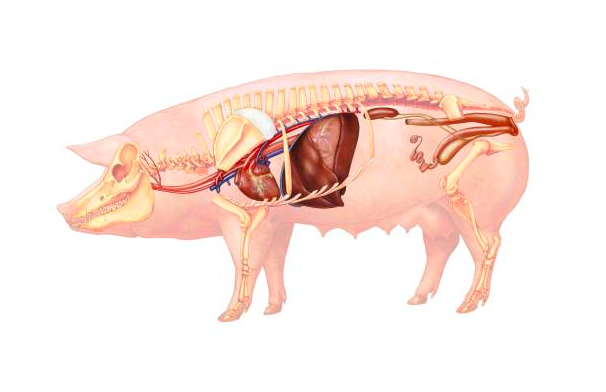Medical professionals connected an externally attached pig liver to a brain-dead human body and observed its blood-filtering capabilities.
This marks a significant advancement in applying this technique to individuals with liver failure.
On Thursday, the University of Pennsylvania made an exciting announcement about a groundbreaking project that explores a unique approach to organ transfers between animals and humans.
In this case, the pig liver was utilized as a means to assist failing livers by purifying the blood outside of the donor’s body, rather than being implanted internally. This is comparable to how dialysis assists kidneys that are experiencing failure.
For decades, xenotransplants, which involve transferring tissue from animals to humans, have faced significant challenges due to the rejection of the foreign tissue by the immune systems of individuals.
Now, researchers are making another attempt using pigs whose organs have been genetically modified to resemble those found in humans.
Over the past few years, there have been experiments conducted where kidneys from genetically modified pigs were temporarily transplanted into brain-dead donors to assess their functionality.
Two individuals also received heart transplants from pigs, unfortunately, they both passed away within a few months.
The Food and Drug Administration (FDA) in the United States is currently considering the possibility of allowing certain individuals in need of a new organ to participate in extensive testing of pig hearts or kidneys.
There are also individuals who are interested in utilizing pig livers. The liver is a highly intricate organ, surpassing the complexity of both the kidneys and heart.
It performs the vital function of purifying the blood, eliminating waste, and synthesizing essential chemicals necessary for various bodily processes.
Currently, there is a significant number of individuals in the United States awaiting a liver transplant.
Pig Liver Filters Human Blood for 72 Hours: Promising Study Results

In the Penn study, researchers linked a pig’s liver, which had undergone genetic editing by eGenesis, to an OrganOx device designed to preserve human livers prior to transplantation.
The body was donated by the person’s family as their parts did not meet the criteria for donation. The machines ensured the blood continued to circulate throughout the body.
Last month, an experiment was conducted where blood was passed through the pig liver device for a duration of 72 hours.
In a statement, the Penn team reported that the donor’s body remained stable and no damage was observed in the pig liver.
Considerable effort has been dedicated to developing machines that mimic the function of liver dialysis machines.
According to Dr. Parsia Vagefi of UT Southwestern Medical Center, experiments using pig livers were conducted years ago, before more advanced genetic techniques became available.
She has no direct involvement in the new experiment, but she is closely monitoring the progress of xenotransplantation research.
Vagefi expressed appreciation for their efforts in moving this forward. He described this method, which combines the use of pigs and devices, as a fascinating advancement in the treatment of individuals with liver failure.
Read also: Health Hazards on the Menu: Identifying 5 Calorie Bombs in Popular Restaurants



